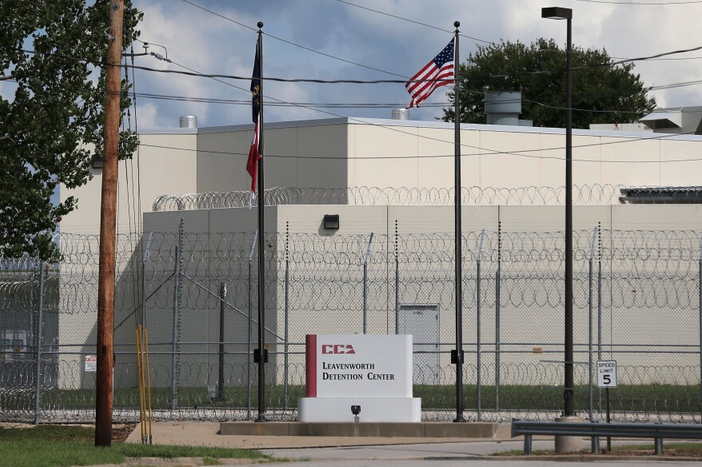
By STEVE VOCKRODT
Kansas News Service
Prisoners awaiting trial or sentencing at the troubled Leavenworth Detention Center should have new confines by the end of the year.
CoreCivic, a publicly traded prison operator, owns the Leavenworth Detention Center, which has been the center of a number of controversies in recent years. They range from reports of poor conditions to authorities eavesdropping on phone calls between prisoners and their attorneys.
The U.S. Marshals Service’s (USMS) lease at the Leavenworth Detention Center ends on Dec. 31 and won’t be renewed. That comes after President Biden issued an executive order early this year to curtail the Justice Department’s use of private prisons.
Plans are underway to transfer the prisoners to another government-run prison facility in Leavenworth.
“Currently, the USMS and BOP (Bureau of Prisons) are collaborating to transfer individuals from the Leavenworth Detention Center to the nearby U.S. Penitentiary Leavenworth,” said Lynzey Donahue, a spokeswoman for the USMS. “Preparations are underway to accommodate the particular needs and rights of those individuals being transferred.”
That leaves unanswered the question of what CoreCivic will do with its Leavenworth facility. An NPR report earlier this year speculated that it may be repurposed to house immigration detainees. The Department of Homeland Security and Immigration and Customs Enforcement have responsibility over immigrant detainees and neither is subject to Biden’s executive order on private prisons.
Currently, immigration detainees are kept at the Chase County, Kansas, Detention Center, about 130 miles southwest of Kansas City. Larry Sigler, the administrator for the Chase County Detention Center, referred questions to the U.S. Marshals Service.
The U.S. Marshals Service did not directly address the immigration detainee question in its response. A spokesperson for the U.S. Immigration & Customs Enforcement (ICE) declined to comment on the record for this story.
Michael Sharma-Crawford, an immigration attorney in Kansas City, said he understood ICE was unlikely to lease the Leavenworth Detention Center.
“There have been meetings of community and immigration folks, and based on those meetings, it doesn’t appear ICE is going to lease the CoreCivic facility at this time,” Sharma-Crawford said.
Sharon Brett, legal director of the ACLU of Kansas, said she has heard similar indications but has not been able to verify the information.
She said a Freedom of Information Act request sent by her office to ICE seeking contracts or correspondence for the Leavenworth facility won’t be fulfilled for at least four months.
“We can’t get definitive answers from anyone,” Brett said
The Kansas City region falls under a larger ICE jurisdiction that’s headquartered in Chicago. Illinois Gov. J.B. Pritzker signed into law a ban on private contracts for immigration detention in that state that goes into effect in 2022, causing some to wonder where detainees in Illinois will end up.
A spokesman for CoreCivic also referred questions to the U.S. Marshals Service.
CoreCivic, whose shares trade on the New York Stock Exchange, noted in a quarterly filing with the Securities and Exchange Commission on Nov. 9 that its lease in Leavenworth with the U.S. Marshals Service was ending in December.
It’s one of seven CoreCivic detention facilities used primarily by the U.S. Marshals Service and whose terms would expire in the next several years. CoreCivic said if those leases are not renewed or the Biden executive order is expanded to apply to ICE, it could have a “material adverse effect” on the company’s business and financial condition.
CoreCivic’s work on behalf of the U.S. Marshals Service accounted for 23% of the company’s total revenue so far this year, according to SEC filings. Contracts with ICE represented 30% of CoreCivic’s revenue.
“It’s a huge business for them,” Brett said.
The quarterly SEC filing said that CoreCivic had entered negotiations with other government partners to use the Leavenworth Detention Center, but it did not specify which ones.
The Leavenworth Detention Center is a 1,033-bed prison that opened in 1992.
The Justice Department’s Office of Inspector General examined the prison in a 2017 report that found a number of management issues, including frequent understaffing and the placement of three prisoners in cells designed to hold two. The inspector general uncovered efforts to conceal the presence of a third inmate in the cells.
The inspector general also criticized the U.S. Marshals Service for its lack of oversight of CoreCivic, including failing to reduce payouts to the company when it understaffed the prison.
A letter earlier this year from ACLU chapters in several Midwest states to the White House and Leavenworth County Commission urged both to stop using CoreCivic in Leavenworth by the end of the year. The letter painted a grim picture of conditions inside the prison, including prison doors that don’t lock and multiple incidents of stabbings this year alone.
“Federal public defenders with clients inside CoreCivic Leavenworth report that stabbings like this are so routine recently that they are almost unnoteworthy,” the letter said.
The prison has also been at the heart of ongoing court proceedings brought by one-time inmates who claim their privileged conversations with their attorneys were illegally recorded and, in some cases, made available to federal prosecutors. The prisoners are seeking to have their convictions vacated or their sentences thrown out.
This story comes from the Midwest Newsroom, an investigative journalism collaboration including KCUR 89.3, IPR, Nebraska Public Media News, St. Louis Public Radio and NPR.






